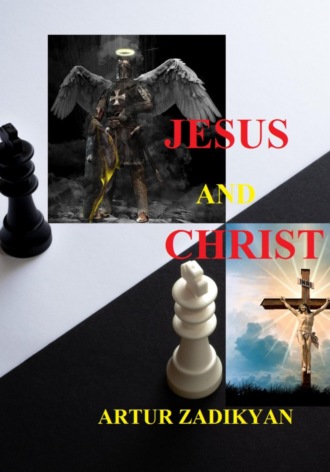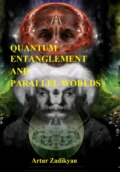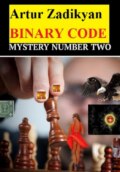
Artur Zadikyan
Jesus and Christ
The theologian threw back his head, twisted his neck, stretched it a little, apologized, and continued:
– Let's move on to the next step. According to the customs and religious canons of society – on the eighth day of His birth He was circumcised and given the name Jesus. There are inconsistencies in the dates, of course. This is what few people think about. Although, by all accounts, Jesus was born in the spring, Christians as the ruling faction decided to overshadow the old holidays with their own. This is me talking about the circumcision of Christ. In Catholicism the date of this event was January 1 on the Gregorian calendar, in Orthodoxy – January 14. Have you ever wondered why we have such a date for New Year's Eve? This is what it is tied to. And in fact this date, which was another holiday, was renamed according to the symbol of the event. I will not go deeper, I'm sure many people know about different dates, which were taken as the starting point of the New Year. And now it is not the same everywhere. In Russia, before the decree of Peter the Great, the beginning of the New Year was September 1. And in general, according to the logic inherent in human nature, at least that which was inculcated by many thousands of years of experience in the upper hemisphere of the planet, the New Year as a process of nature transformation began in spring, somewhere in March. And already in the subsequent understanding of the process changed, became, let's say, closer to human biology. Count: if you conceive a child in March, when will it be born? So it became the time of birth of the hero the location of the planet in the orbit of the Sun ts a in December-January. That's what was celebrated in Rome in the spring. In the whole Roman Empire. Of course, all this came from natural astronomical settings. For example, the day of the solstice or the equinox. Then to such dates began to tie to some important events, for example, in the Roman Empire meeting of consuls. But somehow it was not possible to gather in spring. It was either war or bad weather. We gathered later. And that's how New Year's Eve went on January 1. And then they adapted the circumcision of Christ to it. Well, the difference in days is known as the accumulated inaccuracy between the Gregorian and Julian calendars. Although, as I mentioned, the Orthodox are not ruled by the exact sciences. They follow their own rules. And not to say that they are wrong. They also have every right to ask: why the Gregorian calendar was not adjusted to astronomical time? Everyone has the right to ask, – as a statement the theologian delivered his thought to the audience, for some reason shook his finger in the air and said: – And we will go further. The Gospels do not tell about the further events of Christ's life, up to his baptism as an adult, except for the episode given in the Gospel of Luke (2:41-52), where the evangelist tells about the visit of the Holy Family with the 12-year-old Jesus to the Temple in Jerusalem.
After a pause of three ritualistic twitches of his beard, as if imitating the fairy-tale wizard Hottabych, the professor said:
–Now let's move on to baptism," he said in his refined voice. – According to the Gospel account, at the age of about 30 (Luke 3:23), Jesus entered the public ministry, which he began by being baptized by John the Baptist at the Jordan River. When Jesus came to John, who had preached much about the imminent coming of the Messiah, the astonished John said: "I need to be baptized by You, and do You come to me?" To this Jesus replied that "we must fulfill all righteousness," and was baptized by John. At the baptism, "heaven was opened, and the Holy Spirit descended on Him in bodily form like a dove, and there was a voice from heaven saying, 'You are My beloved Son; in You I am well pleased.'" (Luke 3:21-22) I'm not going to argue here. Remember, I talked about many arguments about different interpretations of the meaning, inconsistency of logical meaning, about contradictions of different places of writing? And depending on the interpretation, the same place in the scripture – a verse, a chapter or a sentence – is explained in different ways. Look, or rather, pay attention to the above quoted… The Holy Spirit descended upon Him in bodily form… In bodily form?! And a voice from heaven was heard. From heaven! Let's not argue why and how in bodily form. But the conclusion is inevitable. It turns out that at this moment the spirit of heaven entered him, and not earlier. After his baptism, Jesus withdrew to the desert to prepare himself in solitude, prayer and fasting for the fulfillment of the mission with which he came to earth. From this we can conclude, and not just so the rite in the church is still called "the sacrament of baptism", that it was a kind of initiation into a secret clan. As if an unspoken record – "he is his own". And he, of course, had to agree to be a supporter of radical ideas. Otherwise, what's the point of secrecy? You have to be in the clan of those who are against the government. Only by accepting this ritual one became one's own. Like members of secret societies or in a clan of thieves: to enter the clan, an adept must commit a crime or something for which he would be persecuted by the authorities. The next thing is preaching. Jesus, as we know, gave a sermon on repentance in the face of the coming of the kingdom of God. Let's just say that this was the overt, propagandistic part of his oratory. Of course, his call to the people was not just a call to be kinder and repent. It was necessary to justify why it was necessary to be kinder, for what and to whom to repent, because God is in heaven, and the bosses mocked here every day. However, it was in his preaching (there were many preachers at that time, it was a kind of fashion in the Jewish tradition) that he emphasized the meaning of some other God than there was. The oppressed and oppressors, as the ruling and those who are ruled, i.e. the hierarchy of power and castes of society, have always existed; this has always been played upon by those who wanted to change this power. That is, to displace and become power themselves. Of course, the power knew it, and those who came to power in this way tried even more to usurp it, to take into account the ways by which they came to power. There are plenty of examples, one can remember the French Revolution with the subsequent rebuilding of the city so that the squares were wide so that barricades would not be built, one can also remember Japan, where a clan of ninja once came to power, and after the leader completely banned the militant sect, and there is no need to talk about the terror and restriction of the freedom of expression by the Communists. For example, Lenin, the brother of a criminal who attempted to assassinate the tsar, could study at university. And in the system of power he founded, the whole family and even fellow villagers would have been banished to the penal colony, if not shot. Under Stalin, certainly. Although there are different opinions on this. If we take into account the fact that revolution weakens the state, then there are plenty of examples of this. The same Jerusalem was destroyed and the Jewish people were subjected to a terrible genocide. Then. I'm not talking about the holocaust. By the way, if you will be shown historical monuments on a tour of Jerusalem, ask about the year of construction. Otherwise, how did the warlord Sèvres completely destroy Jerusalem, and plow up the area. Now, Jesus knew what he was getting into, but look at his geography. Despite the fact that the center of Christ's preaching was the holy city of Jerusalem, the longest with his sermon traveled through Galilee, where Jesus was received more joyfully. It is understandable, because it was his native land. Jesus also traveled through Samaria, Decimated City, and visited Tyre and Sidon. Now remember serfdom. I am not talking about earlier times, especially in the East. Even at the beginning of Soviet power in the USSR not everyone had a passport. Actually, they were introduced then, but you could not go where you wanted to go, especially if you lived in the countryside. Peasants, although they were no longer serfs, and even though they were declared to be owners of not only their land, but of the entire state, according to the promises of the Soviet authorities, they were tied to their collective farm. Their passports were kept with the chairman. You could leave only with his permission. And now imagine: someone in the occupied territory, where everyone is suspected of rebellion, goes wherever he wants, over long distances, and even agitates people, talking about the allegedly impending arrival or the need to change the government to escape the oppression of the invaders. Could mere mortals feel so at ease, do you think? But let's not be pathetic. Let's think about the real life of that society. After all, you must agree, whoever Jesus was, whoever he was in our view, in our faith – he was killed as a man. What do you say to me? I think, either Jesus had some power, or he was favored, and the power itself, or the story is embellished in the process of numerous historical edits, or the author's imagination found it most attractive to make such a picture of Jesus' life, without thinking about the real state of affairs, or … perhaps we do not know something. That's what our mission is organized to do. Though in fact we want to prevent a tragic event for our civilization. Agree: to give birth, to force your creation to follow the doctrine, and then to realize the apocalypse – well, at least not divine, both in the sense of reasonable logic and love, as God positions himself. Well, or he is so positioned to us, his representatives, including me.
Having said the last, the cultist studied the listeners with a beaming smile on his face.
– Therefore, a doctrine that contains the message that in the end a grandiose tragic event for all mankind must happen is questionable as to its veracity. Or… the prediction of this apocalypse, or, as they say in the common people, the end of the world, was inserted there… or rather, it was inserted by those who, holding in their hands the "reins" of controlling human souls, are trying to realize it with ц spruce of universal terror. Or maybe it is even cooler. Imagine how this prediction is understood by artificial intelligence. If it finds it acceptable, justified by its creator, it will try to realize it while creating the conditions under which it is supposed to happen.
The theologian, to allow time to savor what he had heard, holding his hands behind his back, walked around the pulpit and returned to his seat.
– Let's go one step further. One more excerpt from the Gospel, the details of which indicate the scope of Jesus' organizational activities and show another angle of the lone preacher. I apologize, I'm being a little ironic with the word "lonely." Look: many followers gathered around Christ, from whom he first chose 12 of his closest disciples – apostles (Lk. 6:13-16), then 70 more (Lk. 10:1-17), already less close, who are also called apostles, some of them, however, soon departed from Christ (Jn. 6:66). Apostle Paul reports that at the time of Christ's death on the cross and resurrection He had more than 500 followers (1 Corinthians 15:6). And according to some researchers' estimates, it took at least 2 thousand people to capture and hold the Jerusalem temple. It is kind of necessary to clarify what the Jerusalem temple was then. According to Jewish sources, trade was never conducted in the temple itself. According to Christian sources, trade was conducted there. What does that mean? Trade was conducted on the principle of a fair, but not in the temple itself, but on the territories nearby. The then Consumer Protection Agency in the person of the high priest gave permission for this. The reason is not difficult to understand: all the income from the rent of the place went to God's work, as he called it. That is, to him and… you know, nothing is new under the moon. Accordingly, there were premises on that territory, though temporary, or maybe rented, in which, for example, goods were stored. Since the fair was not held in one day. The essence of Christ's actions: to use this desecration of God's house and to show the discontent of the people at the same time. It is roughly like the Bolsheviks seized banks and factories. People need money for revolution. Let's remember Kamo and Joseph Vissarionovich. About desecration of the house of God, to which Jesus appealed, the question is in the same concept – God is God's and Caesar is Caesar's. Caesar was the ruler of the empire of Rome. And when Jesus was asked if he could pay tribute to Rome, he answered in this style. And there you can understand as you want. That is, as if the temple – the place of God, should live on donations, as, say, a party on membership fees. But even then and in the modern world everything is leveled when the power begins to burn palms. The official evangelical historiography tells us the following: Jesus' teachings were supported by various miracles, he was glorified as a prophet and healer of incurable diseases. He raised the dead, tamed a storm, turned water into wine, fed 5,000 people with five loaves of bread, and much more. Remember what I said about coming to power and then banning the methods by which one came to power. What's my point? About miracles. Remember what I said about the warning about miracles by the Second Coming. How any messiah can be turned into a false messiah… That is, miracles are only licensed by the power. Power over the souls of men. From the Gospel of John we learn: Jesus was in Jerusalem four times for the annual Passover celebration. Hence we conclude that Christ's public ministry lasted approximately three and a half years. True, it is not known exactly whether he went there every year in succession. The events of the last days of Jesus Christ's earthly life, which brought him physical and spiritual suffering, are referred to the Passion (suffering) of Christ. The Church remembers them in the last days before Easter, during Holy Week. A special place among the Passion of Christ is occupied by the events that took place after the Last Supper: arrest, trial, scourging and execution. The Crucifixion is the climax of the Passion of Christ.
The customary survey of the audience followed, exhaling, announcing the next topic:
– So, next is the judgment. The Jewish chief priests, having condemned Jesus Christ to death at the Sanhedrin, could not carry out the sentence themselves without the approval of the Roman governor. According to some scholars, the Sanhedrin recognized Jesus as a false prophet based on the words of Deuteronomy: "…but the prophet who dares to speak in my name what I have not commanded him to speak, and who speaks in the name of other gods, such a prophet you shall put to death" (Deuteronomy 18:20-22). Here, too, in this part of the scripture, the same insurance against the encroachment of authority is played out. The options are provided in advance to refute and, if necessary, to defame, as we see, even to kill anyone who would encroach on the established clan of power. After unsuccessful attempts by the chief priests to accuse Jesus of formally violating Jewish law, Jesus was handed over to the Roman procurator of Judea, Pontius Pilate (26-36). At the trial, the procurator asked: "Are you the King of the Jews?" This question was due to the fact that claiming authority as King of the Jews, according to Roman law, was considered a dangerous offense against the Roman Empire. The answer to this question was Christ's words, "You say that I am a king. For this cause I was born, and for this cause I came into the world, that I should bear witness to the truth" (John 18:29-38). Pilate, finding no guilt in Jesus, was inclined to let him go and said to the chief priests, "I find no guilt in this man" (Luke 23:4). Pontius Pilate's decision caused an uproar among the Jewish crowd, directed by the elders and chief priests. In an effort to prevent a riot, Pilate addressed the crowd with a proposal to release Christ, following the long-standing custom of releasing one of the criminals at Passover. But the crowd shouted: "Let him be crucified" (Matthew 27:22). As a final attempt to spare Jesus from death, Pilate had him beaten in front of the crowd, hoping that the discontented would be satisfied with the sight of a bloody condemned man. But the Jews declared that Jesus must die, because he had made himself the Son of God. Pilate, when he heard this word, was more afraid. Pilate went into the Praetorium again and said to Jesus, "Where are you from? But Jesus gave him no answer. Pilate said to Him, "Do you not answer me? Do you not know that I have the power to crucify You and the power to release You? Jesus answered, "You would have no authority over me, unless it had been given to you from above; therefore it is more sinful for him who delivered me to you. From that time Pilate sought to release Him. But the Jews cried out, "If you let Him go, you are no friend of Caesar; anyone who makes himself king is an adversary of Caesar" (John 19:7-12). I would like to focus your attention on the phrase, "…therefore it is more sinful on him who delivered me to you." Does this phrase seem ambiguous to you? It clearly carries the connotation of blasphemy, complaint, and offense. The phrase is preceded by the definition, "You would have no authority over me if it had not been given to you from above. That is, here he speaks of God's authority. For he was clearly not speaking of Pilate's superiors, much less of those who betrayed him in fact, if such was the case. Believe me, it is debatable. What we learn next: fearing the people (the Gospel account says so, though he feared more denunciation to Rome from the religious oligarchs), Pilate passed the death sentence – sentenced Jesus to crucifixion, and he himself "washed his hands before the people, and said, I am innocent of the blood of this Righteous One" (clearly he would not use the phrase "this Righteous One," but we'll keep quiet and move on). To which the people exclaimed: "His blood is upon us and upon our children" (Matthew 27:24-25). According to the sentence of Pontius Pilate – Jesus was crucified outside the walls of Jerusalem on Mount Golgotha, where he, according to the Gospel story, carried his cross himself. Two robbers were crucified with him. In spite of his death pains, Christ uttered several phrases on the cross. Let me draw your attention to some of them. For example, to His mother He said: "Woman, behold, your son" (John 19:26); to His disciple: "Behold, your mother!" (Jn. 19:27); most interesting, perhaps, in terms of mystery: "It is accomplished!" (Jn. 19:30) Mysterious and interesting – before his death. Because afterward he, according to the scripture… And let me quote the original a little bit here.
The narrator scratched his forehead, lowered his head a little, following his own ritual, looked around the listeners, as if studying their thoughts, clarified:
– Okay, one of the translation and presentation options. Although the variants don't differ much from each other at this point. Let's hear it.
… At the cross of Jesus stood His mother and His mother's sister, Mary Cleopas, and Mary Magdalene.
When Jesus saw his mother and the disciple standing there, whom he loved, he said to his mother, "Jono, behold, your son.
Then he said to the disciple, "Behold, your mother! And from that time this disciple took Her to himself.....
Nomor "turned on" the pause again. The audience had already reflexively tuned in to the accent in the story.
– Pay attention to this place. Don't you think it's a little strange?
The hall was silent and waited for the professor's opinion. Apparently, he intuitively understood it already.
…Then Jesus, knowing that all things were already accomplished, let the Scripture be fulfilled, said, I thirst.
There was a vessel full of vinegar. The soldiers put a sponge full of vinegar on the hyssop and brought it to his mouth.
– And that too, doesn't that seem odd?
… When Jesus had tasted the vinegar, he said, "It is finished! And he bowed his head and gave up the spirit.....
– And this is the place I would like you to pay special attention to. For now.
…But since it was then Friday, the Jews, lest they should leave their bodies on the cross on the Sabbath, – for that Sabbath was a great day, – asked Pilate to break their shins and take them off.
So the soldiers came, and they broke the shins of the first, and of the other who was crucified with him… But when they came to Jesus, as they saw him already dead, they did not break his shins....
– Here is a very important point: "…but one of the soldiers pierced His ribs with a spear, and immediately blood and water flowed out. Further, "…After this Joseph of Arimathea, a disciple of Jesus, but secret for fear from the Jews, asked Pilate to remove the body of Jesus; and Pilate allowed it. He went and removed the body of Jesus." In another version: "Meanwhile, a new petitioner appeared before Pilate, who wanted permission to take down the body of Jesus from the cross and give it up for burial. That was Joseph of Arimathea." Arimathea, Joseph's fatherland, comes from the name of the small town of Ramah mentioned by the evangelist Matthew. Joseph is described as a wealthy man of "…high character and blameless life." His great wealth made him a person of great importance, especially since at that time in Jerusalem everything could be bought with money, from the position of the last tax collector to the office of high priest. In addition, Joseph was one of the most prominent members of the Sanhedrin, and together with other well-meaning counselors, probably constituted an opposition to the party of Caiaphas. He was a secret disciple of Jesus Christ and did not participate in the last attempts of the Sanhedrin against the Savior, as well as in the trial of Christ. Nicodemus also came, – who came before to Jesus by night, – and brought a composition of smyrna and aloes, a liter about a hundred. At the moment of Jesus' death, the sun went dark, the veil that separated the holy of holies from the rest of the temple in Jerusalem was torn, there was an earthquake and the resurrection of many deceased saints (Matthew 27:51-53). After Jesus' death on the cross, with Pilate's permission, the body was taken by Joseph of Arimathea for burial, which he performed with Nicodemus in a previously unused tomb that had been cut into a rock on land owned by Joseph, near the garden close to Golgotha. According to Christian legend, after his burial, Jesus descended into hell and, after crushing its gates, brought his gospel message to the underworld, freed the souls imprisoned there, and brought all the Old Testament righteous, including Adam and Eve, out of hell. Notice this place. Does it seem to you that some secret thought is hidden here? Perhaps it has come to us after editing. Doesn't this place, the event described, speak of dissatisfaction with the decision made earlier? I would say more than that. After all, the decision to imprison sinners in hell was made as if by God himself. Get the idea? Now project this into reality. Imagine if an opposition party or an opposition leader called for the release of political convicts from prison. Get the idea?
– Ess, sir," Venus reported as everyone nodded, showing her status from "recruit to conspirator".
The theologian took it rather coldly.
– A few words about the Resurrection," he said without changing his tone. – The Resurrection of Christ is the most honored event in Christianity, the most important holiday. It is marked by Easter. The moment of finding the empty tomb of Christ is described differently in different Gospels. According to one version, Mary Magdalene alone – and according to others – with the mother of Jesus or not only the two of them – came after the Sabbath to the Tomb of Christ and saw that it was empty. Two angels and Jesus himself appeared to her, whom she did not immediately recognize. Isn't that strange? Isn't it? But we have agreed not to deviate too much from the central line of the study. Let's see what happened next. In the evening Christ miraculously appeared to His disciples, among whom Thomas the Twin was not present. This was the sixth appearance. There were ten in all. So those who believe in the Second Coming are not waiting for the second coming, but for the eleventh coming. This is the paradox. Most likely the disciples, followers of Christ, gathered to their meetings. As well as many religious groups and sects nowadays. It is strange that Jesus came to the meeting with his disciples, who, by the way, should have believed in his resurrection. So, it turns out that they did not believe in his preaching either. At least not in all of it. Thomas, as we know already from tradition, was the most unbelieving. He did not believe in the stories of his companions about the resurrection of Christ, saying: "unless I see on His hands the wounds of the nails, and put my finger into the wounds of the nails, and put my hand into His ribs, I will not believe" (John 20:25). There is some strangeness here, too, about "putting the finger in." The ignorance of human anatomy, or at least of warm-blooded organisms, is clearly observed by the authors of the statement. The wound should have healed, healed, at least such holes would not have formed. But that's okay too… What's next? – asked the professor.
From the manner of the dialog it appeared that he asked himself.
– And then it would be good to move on to the process itself," Jupiter said.
Nomor responded to this less than courteous remark in a very original and unexpectedly epathetic manner:
– Ahtung, ahtung, as the heralds of one of the many who also thought they were the messiah. I say soon. Knowledge is also a tool. How can we find the light at the end of the tunnel if we are without a candle?
The listeners smiled at what was said. Apparently, because of the close affinity of the association with the topic being presented.
– According to legend, the moment of Jesus' resurrection, as well as the moment of his birth, was not seen not only by men, but even by angels. I read your thoughts, I do.
Nomor looked at all the listeners and added, smiling:
– Just kidding, though I understand the thoughts that have arisen in your mind.....







